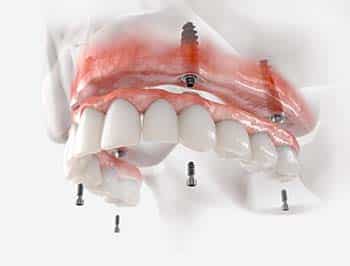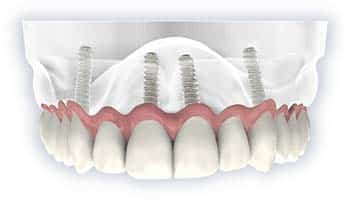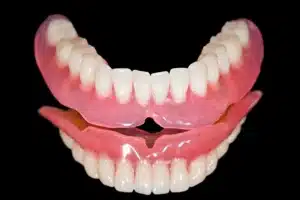Research shows that millions of Americans are missing one or more teeth- which leads to a variety of physical and mental health issues. Your teeth are designed to break down your food for digestion- and missing teeth can make eating healthy foods challenging. If you are not eating healthily, the rest of your body suffers. Also, for many patients, self-confidence is tied to the condition of their teeth.
For many decades, the primary options for replacing missing teeth were full or partial dentures and bridges. These are typically removable, so while they did somewhat restore aesthetics, functionality was almost always still a problem. Now, there are other options.
For patients who are missing all or most of their natural teeth, All-on-4 Dental Implants is a cost-effective tooth replacement solution. On average, a full arch of teeth costs between $12,000 to $25,000 with All-on-4. If you wanted to replace a full arch with single dental implants, it may cost $40,000+.
If you are missing all or most of your teeth, visit Dr. Avi Matha at Normandale Dental to learn more about your options.
What do you mean by All-on-4 Dental Implants?

Types of All-on-4 Dental Implants
There are two different types of dental implants used in All-on-4 dental implants: titanium or zirconium.
Titanium Dental Implants
Since the 1960s, titanium has been used as a dental implant material. This is the most widely researched dental implant material and remains the most popular due to several reasons:
- Ease of care/maintenance
- Life expectancy/longevity
- Efficacy
Titanium Implant Advantages vs. Disadvantages
Titanium dental implants have advantages and disadvantages. The advantages include:
Durability:
typically, patients with conventional dentures must change their diet because the dentures are unable to withstand the chewing pressure required for some meals. On the other hand, titanium is highly resistant to breakage and can withstand normal bite pressure.
Long-term success:
titanium has been used in dental implants since 1965- but became the go-to material in the 1970s. This means that researchers have had a lot of time to investigate the long-term success rate of this material.
Biocompatibility:
titanium is biocompatible, which means it functions well within the human body. After implants are placed, the jawbone heals around and fuses with the implant, securing it in place and providing a strong foundation for prosthetic teeth.
Hypoallergenic:
titanium is safe even for patients who have metal allergies or sensitivities.
On the other hand, titanium does have a few disadvantages as well:
Potential allergic reactions:
titanium dental implants are 90% to 99% titanium, which leaves room for 1% to 10% other metals including vanadium, tungsten, zinc, tin, chromium, or nickel. While titanium is hypoallergenic, these other materials are not- which means the implant may fail due to an allergic reaction.
Unappealing aesthetics:
titanium dental implants cause cosmetic concerns in some patients because the black metal is sometimes visible in patients with thin gums.
Zirconia Dental Implants
Zirconia is a material that is becoming a popular non-metal alternative to titanium dental implants. Zirconia is a ceramic-like material that looks more like a natural tooth. In comparison, zirconia offers a more attractive appearance and offers a better soft-tissue response than titanium.
Zirconia Implant Advantages vs. Disadvantages
There are several advantages and disadvantages of zirconia dental implants. The advantages include:
Improved aesthetics:
one of the disadvantages of titanium is its dark color. Since zirconia is tooth-colored, it won’t be visible- even in patients who have thin gums.
Less plaque/corrosion resistant:
zirconia implants develop less plaque than titanium implants and are associated with fewer infections. Also, since this material is ceramic-like instead of metal, it is highly resistant to corrosion.
Hypoallergenic:
many patients have metal allergies and while titanium is also hypoallergenic, other metals are often used which can trigger a reaction. Zirconia is metal-free, which means the risk of adverse reactions is significantly reduced.
On the other hand, zirconia also has a few disadvantages:
Not as many options:
over the past 15 years, zirconia has undergone some significant advances. However, they are still not as adaptable and there are fewer alternatives compared to titanium when it comes to function, size, and solutions for complicated treatments.
Not as practical:
zirconia is not as viable for sophisticated oral treatments as titanium.
Not as durable:
while zirconia is a strong material, it is not as strong as titanium. It has a lower fracture strength and may shatter under stresses that cause them to bend/flex. In the long run, zirconia is more likely than titanium to break and cause problems.
What Factors Impact the Cost of All-on-4 Dental Implants?

- Type of dental implant material
- Type of overdenture material
- Experience of the dentist
- Location of the dentist
- Additional procedures required (gum disease treatment, extractions, etc)
Is All-on-4 Dental Implants a good investment?
Yes, All-on-4 dental implants are an excellent investment because of the advantages they offer compared to other tooth replacement options.
Is All-on-4 Dental Implants worth the cost compared to traditional dentures?
While traditional dentures are a great option for tooth replacement, especially for patients who are on a very strict budget, All-on-4 is well worth the cost difference due to three major factors:
First, traditional dentures require the use of denture adhesive to secure them in place, while the prosthesis is held in place with dental implants in All-on-4. This means that they won’t slip around in the mouth, and they are easier to maintain than traditional dentures because you don’t have to worry about removing them to clean them, and food won’t get stuck under them.
Second, since they are secured in place by the implants, All-on-4 is one of the more natural-looking options for replacing missing teeth. This makes them much more aesthetically pleasing than traditional dentures. Most people won’t be able to tell you have prosthetic teeth unless you tell them or they look really close.
Third, All-on-4 is more comfortable than traditional dentures. Traditional dentures sit on top of your gums, which can cause discomfort, and, in some cases, sores may develop from the rubbing. Since the dental implants are inserted into the jawbone, they hold the prosthesis in place, keeping it from slipping around.
All-on-4 Dental Implants FAQs
When you are exploring tooth replacement options, we understand that you may have questions. Some of the most common questions Dr. Matha and the team hear at Normandale Dental about All-on-4 include:
Is All-on-4 Dental Implants a good solution?
All-on-4 dental implants offer a variety of advantages over other tooth replacement options, so they are definitely one of the superior solutions for tooth loss.
How much is a full set of dental implants?
A full set of single-tooth dental implants may be $40,000+. On the other hand, All-on-4 typically costs between $12,000 to $25,000. Therefore, while still expensive, it is much more budget-friendly.
Is it hard to transition from snap-on dentures to All-on-4?
No, it is not hard to transition from snap-on dentures to All-on-4. We would simply replace the prosthesis with one that connects permanently.
Is All-on-4 better than traditional dentures?
Yes, All-on-4 is a much better option than traditional dentures. However, traditional dentures are better than ignoring and living with missing teeth.
How long do All-on-4 Dental Implants last?
All-on-4 dental implants are designed to be a permanent solution. Therefore, they should last a lifetime. Depending on your oral hygiene habits and lifestyle, you may or may not need to replace the prosthesis within a few years.
Schedule Your Consultation at Normandale Dentist Today
If you are missing all or most of your teeth, schedule your consultation with Dr. Matha and the team at Normandale Dental. We have the experience and expertise to help you decide which option is ideal for your goals and your budget.
We are located on Hyland Greens Dr in Bloomington. Our office hours are Monday through Thursday 8 to 5 and Friday 8 to 4. We look forward to working with you to restore your smile and improve your confidence.





